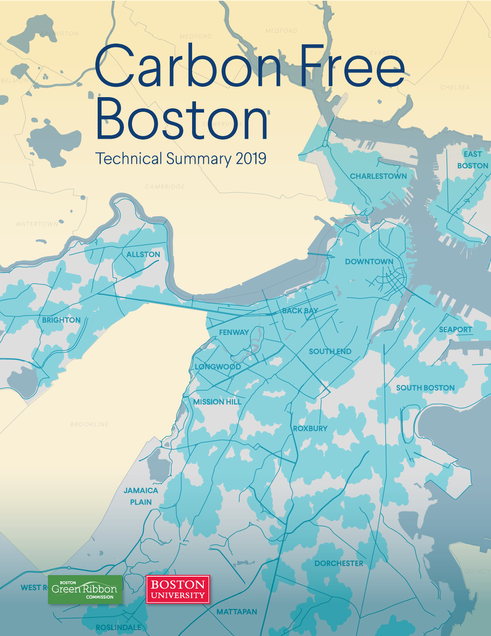Carbon Free Boston
Making Boston carbon-free by 2050
The City of Boston has pledged to become carbon neutral by 2050. The Institute for Sustainable Energy’s (now the Boston University Institute for Global Sustainability) Carbon Free Boston project provides real-world data to bring new insights to Boston leaders as they seek to achieve net-zero emissions in the next several decades.
The Carbon Free Boston reports extensively use real-world data to bring new knowledge and insights to the City of Boston’s Climate Action Plan 2019 update and overarching goal of reaching carbon neutrality by 2050. Comprehensive analysis led by the ISE in collaboration with the Boston Green Ribbon Commission evaluates key strategies across four emissions sectors–transportation, buildings, waste, and energy–while providing a deep understanding of related social equity impacts.
Read the Carbon Free Boston Summary, Technical, and Social Equity Reports, published in 2019:



Project Objective and Methods
Comprehensive analysis, led by the Institute for Sustainable Energy (now the Institute for Global Sustainability), evaluates and quantifies the most effective combinations of strategies to reduce greenhouse gas emissions (GHG) in the transportation, buildings, waste, and energy sectors while also describing the potential social equity benefits.
The Institute for Sustainable Energy’s (now the Institute for Global Sustainability) research focused on four mutually reinforcing strategies:
- Energy efficiency: Minimizing the demand for energy through high-performance buildings, a shift to public and active transport, the purchase of clean energy, and waste diversion.
- Electrification: Transforming fossil fuel systems, such as vehicles and furnaces, to electricity powered by carbon-free energy sources.
- Clean energy: Reduce emissions by maximizing rooftop solar, purchasing clean electricity, and converting district energy to carbon-free energy sources.
- Social impact: Improving social outcomes with intentional action to reduce emissions while simultaneously improving the quality of life for socially vulnerable populations.
Research Outcomes
- Demand reduction in the transportation sector must address the high number of long-commute trips with very little mode shift potential. Solutions include improved bicycle facilities, dedicated bus lanes, fare reduction on public transit, and congestion fees.
- Electric vehicles are a cost-effective, high-impact carbon abatement strategy in the transportation sector.
- The electrification of the buildings sector is a challenge because heating systems typically have lifetimes of 20 to 30 years. The cost of heat pumps and electric boilers is declining, making them a feasible abatement strategy. The biggest challenge is a whole building retrofit for the tens of thousands of older existing buildings in the City. This requires new, innovative methods of finance.
- To increase the clean energy supply, the City of Boston can require the procurement of 100 percent carbon-free electricity through various procurement mechanisms. Clean electricity is available from a wide variety of sources including wind, solar, hydro, and nuclear power, both within and beyond the regional electric grid.
- Along with climate benefits, demand-reduction can deliver significant benefits such as continued cost savings, job creation, and improvement in public health.
Additional Project Resources
View archived Carbon Free Boston presentations, meeting notes, and more on OpenBU.


